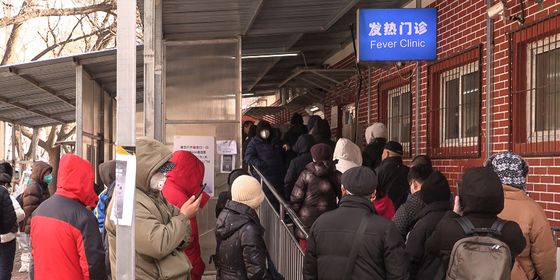Canned peaches sell out as fever cure and ‘Travel Code’ goes offline as China shifts pandemic narrative, and new Nanjing Massacre diary published—it’s Viral Week
China phases out ‘Travel Code,’ shifts Covid narrative
“Travel Code,” a Chinese mobile phone application that tracks a person’s travel history, is going offline as of midnight of December 13. The application was developed by the China Academy of Information and Communications Technology jointly with China’s three major telecommunications companies in February 2020. It has been used in the past to deny people entry into certain cities or public places if they’ve traveled to “risk areas,” which could cause their code to change color or show asterisks next to the locations traveled.
These changes come as China further relaxes its pandemic-control policies and shifts its narrative on Covid-19. The latest round of measures announced by central authorities on December 6 radically changed the scope of lockdowns, testing, and quarantine, as people who are asymptomatic or have mild symptoms are allowed to isolate at home. Testing has been rolled back and negative test results are no longer required to take public transport and even enter entertainment venues in cities like Beijing. Health experts like Dr. Zhong Nanshan have also gone on record stating that 99 percent of Covid-19 patients can recover on their own in seven to 10 days, and there’s no conclusive evidence of residual effects from the disease.
Canned peaches sell out as Chinese seek Covid-19 home remedies
Canned peaches, a comfort food many people from Northeast China remember being given to treat fevers when they were children, are reportedly selling out in many provinces as authorities begin encouraging home isolation and self-medication for Covid-19 in lieu of centralized treatment. It is unclear how canned peaches became a popular home remedy against illness, though speculations abound about the character for peach (桃) being a homophone for “escape (逃),” and the placebo effect due to the sugary treat’s ability to stimulate the appetite. Many cities are also seeing shortages of conventional fever medicine such as ibuprofen, and traditional Chinese remedies against colds and flu.
Handwritten Nanjing Massacre diary made public for the first time
A handwritten manuscript detailing a Nanjing family’s escape ahead of the Japanese invasion of the city in 1937 has been published in a journal ahead of the national memorial day for the 85th anniversary of the Nanjing Massacre on December 13. Titled “Memoirs of a Refugee,” the 19,137-character manuscript was written by a government official named Wu Yanqiu probably in 1949, and was discovered in the special collections of the Nanjing University Library in late 2021. The Nanjing Massacre, which took place in the six weeks after the Japanese invaded the city on December 13, 1937, is estimated to have killed 300,000 Chinese civilians and unarmed soldiers, and led to the rape and torture of many more; there are 54 known survivors still remaining from the tragedy.
Woman spends 10,000 yuan in living expenses in one day
A woman caused a furor online with a video claiming she spent 10,000 yuan (approximately 1,400 US dollars) in one day, an amount given to her by her husband meant to last a whole month. The woman said her husband was angry about her spending, but she wanted to make a video to justify her expenses, which included 5,000 yuan in a yearly spa membership, 2,000 yuan to pay their housekeeper, 200 yuan to buy her husband shoes and clothing, and the remainder for her child’s tuition fees, home utilities, and parking fees. Netizens are divided in their views, with some opining that most of the costs were reasonable given the current cost of living, others pointing out that the woman spent 50 percent of her allowance on the rest of the family, and many recommending the couple simply communicate better about what is considered a “reasonable” expense.
Grandfather regrets selling apartment to grandson for 10 yuan
An 85-year-old man in Wuxi, Jiangsu province wants to get back an apartment he transferred over to his grandson’s name years ago for a symbolic payment of 10 yuan. The man, identified under the alias Zhang Ping, says he gave away the apartment so that his grandson could attend the school in the associated school district, but sued his son, the boy’s father, to gain back the apartment after the two became embroiled in a dispute last year. The court ruled against the elder Mr. Zhang in his most recent appeal, saying he did not provide sufficient evidence that he gave away the apartment solely that his grandson may attend the school.
Apple thief claims to have wanted to pay all along
A woman in Jinan, Shandong province called the police claiming that she went to an orchard to buy apples, but the owner wouldn’t let her leave. After investigating the matter, police found that the woman had actually come along with several friends to steal over 10 bags of apples, and this was the third time she had done so. The woman claimed that she’d always intended to pay for the apples if she was ever caught.













